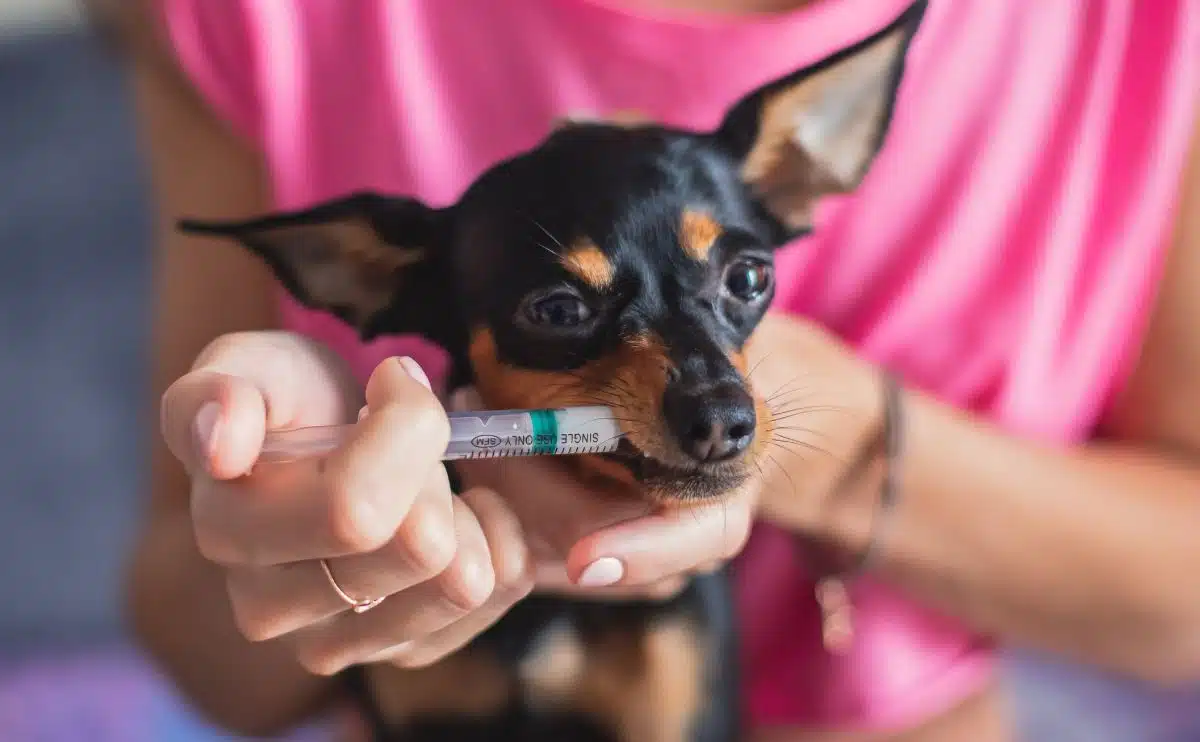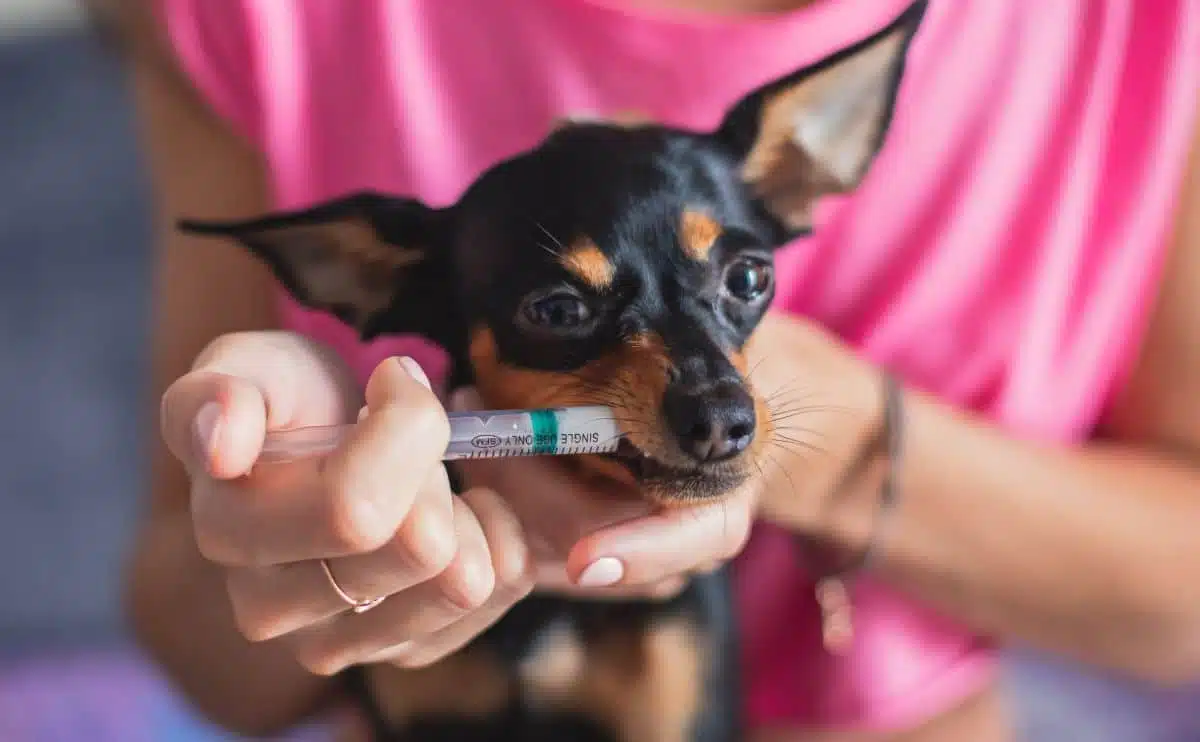
To keep the lights on, we receive affiliate commissions via some of our links. Our review process.

Prednisone is a synthetic corticosteroid (steroid) used to treat a variety of conditions in pets. It is a prescription-only medication that can only be prescribed by a veterinarian. If your vet has been prescribed prednisone for your dog, you may have a lot of questions about what the medication is, why it has been prescribed, and what the potential side effects are. Let’s find out more about this common canine medication, what prednisone does, and how to support your dog while he or she is receiving this medication.
What Is Prednisone?
Contents
Prednisone is a prescription drug, or type of medication, that can be prescribed in various forms to treat a variety of illnesses. It is a synthetic (man-made) form of cortisol hormone which is found naturally in the body and produced by the adrenal glands. It is primarily used as an anti-inflammatory drug but can also be used to suppress the immune system at higher doses and as part of cancer treatment.
The names prednisone and prednisolone are sometimes used interchangeably. They are similar medications, but not the same. Prednisolone is the active metabolite of prednisone, converted by the liver so that it can cross the cell membrane and function properly.
Glucocorticoids are a class of drugs that encompass different types of steroids, both natural and synthetic. Prednisone is one example of a synthetic glucocorticoid. However, many others exist.
What Is Prednisone Used For In Dogs?
Prednisone is a corticosteroid used to treat a broad range of medical conditions. Vets prescribe it as an anti-inflammatory medication or an immunosuppressant to treat conditions such as:
- Allergic reactions
- Itching
- Skin disease and ear disease (otitis) with inflammation
- Arthritis and orthopedic diseases
- Inflammatory bowel disease
- Asthma
- Immune-mediated diseases such as Immune-mediated hemolytic anemia (IMHA)
- Neurological diseases, including spinal shock
- Hormone deficiencies such as Addison’s disease (hypoadrenocorticism)
- Diseases that cause abnormal calcium homeostasis
- Cancer and tumors
Prednisone Dosage For Dogs
The dosage of prednisone for prednisolone for dogs will vary depending on the condition being treated, their body weight, and their response to treatment.
When prednisone is used as a replacement hormone to treat Addison’s disease, it is generally used at a very low dose. When treating inflammation, prednisone can be started at a moderate dose and then gradually weaned down depending on the response to treatment.
When steroids are used to treat immune-mediated (or auto-immune) disorders, they are used at a higher dose to suppress the immune system. Treatment is usually carried on for longer than when used to manage inflammation, and the dose is weaned down more gradually.
It is important to follow your vet’s instructions carefully regarding dose. Your vet may increase or decrease the dose of prednisone based on your dog’s response. Your vet will try to find the lowest dose possible while still maintaining your dog’s health.
Do not stop administering steroid medication suddenly, unless on the advice of your veterinarian, as it could interfere with the natural production of steroid hormones in your dog’s body leading to serious complications.
Types Of Prednisone For Dogs
Prednisone and other glucocorticoid drugs come in a variety of different forms, depending on the condition being treated. Prednisone is commonly given to dogs as an oral tablet. However, a liquid preparation may be more suitable for small dogs or when small doses are administered.
Prednisone may also be administered as an eye drop to treat certain ocular diseases, as a skin cream to treat skin inflammation, or in a nasal spray or inhaler to treat conditions of the respiratory system. Prednisone may be administered by a veterinarian as an injection, either intravenously or into the muscle, in some emergency situations, such as anaphylaxis.
Prednisone For Dogs Side Effects
Prednisone is a synthetic form of the steroid hormone cortisol, which is found naturally in the body. Many of the unwanted effects of steroids on the body are similar to the effects this hormone has on the body. The most common side effects of steroids in dogs are increased thirst and urination. Prednisone side effects vary between dogs and with doses. Common side effects include:
- Increased thirst and urination
- Increased appetite
- Restlessness
- Panting
- Vomiting
- Diarrhea
- Distended abdomen (‘pot-bellied’ appearance)
- Poor hair coat or hair loss
Cushing’s syndrome (not to be confused with Cushing’s disease) refers to a collection of symptoms that are associated with long-term use of steroids or over-production of the natural steroid hormone in the body.
Prednisone, and other steroid medication, can be rarely associated with more serious side effects such as gastric ulceration, liver failure, or kidney failure. The risk of this increases if dogs are taking certain other drugs alongside steroids, so be sure to tell your vet if your dog is taking any other medication if they have been prescribed prednisone.
Your veterinarian may recommend blood tests to monitor the effects of prednisone on your dog’s body, especially with long-term treatment. This will help your vet to use the medication in the safest way possible and adjust the dose as necessary.
Tips For Dogs On Prednisone
Prednisone commonly causes dogs to drink more and urinate more. Ensure they always have access to fresh water. Restricting water for dogs on prednisone is not recommended. You may need to avoid letting them drink excessive amounts at one time because they may regurgitate or vomit. Increased drinking leads to more pee. Make sure your dog gets extra bathroom breaks to relieve themselves.
Some dogs are very hungry when taking prednisone. Keep in mind, though, that extra food may cause weight gain. Consider feedings smaller, more frequent meals or offer treats of good quality, lean protein.
Prednisone For Dogs With Cancer
Prednisone may be used as part of a chemotherapy protocol to treat different types of cancer in dogs or on its own as a palliative treatment. It can be used as pre-treatment before surgery to reduce inflammation associated with a tumor or shrink the size of a mass. Steroid medication may help to increase appetite in cancer patients. The dose of prednisone used to treat cancer and how often it is administered depends on the type of cancer and what other medication the pet is receiving.
Frequently Asked Questions
How long can a dog stay on prednisone?
This depends on the condition being treated. Some diseases, such as Addison’s disease, require life-long treatment to replace the missing hormone in the body. Inflammatory conditions, such as ear disease, may only require a short course between 1-3 weeks. Long-term prednisone administration may be associated with more side effects.
Is 20 mg of prednisone a high dose for dogs?
It depends on the size of your dog. Your veterinarian will prescribe an appropriate dose for the body weight of your dog and the condition being treated.
What is the life expectancy for a dog with lymphoma on prednisone?
Lymphoma is a cancer of the immune system, but different forms of lymphoma exist, which have varied prognoses. If prednisone is used on its own as palliative treatment for lymphoma rather than as part of a multi-drug chemotherapy protocol, then survival times are considerably shorter. For multicentric lymphoma in dogs, treatment with prednisone alone may have a survival time as short as 1-3 months.
How much is prednisone for dogs?
The cost of prednisone depends on the type you use, the amount you need, and where you purchase it from. Steroid medication is generally regarded as a relatively cheap drug within veterinary medicine. As a rough guide, a 20mg tablet will cost between $0.17 and $0.32 per tablet in North America.
Does pet insurance cover prednisone and other medications for pets?
Prednisone and other medicine are eligible for coverage through most pet insurance policies, but there are some restrictions. Vet-prescribed drugs are typically covered through insurance. However, some insurers may require you to upgrade plans or purchase an add-on for prescription coverage.
Additionally, if the condition for which the prednisone is necessary is considered pre-existing, pet insurance will most likely exclude it from coverage.
Is prednisone for dogs the same as for humans?
Prednisone and prednisolone are prescription drugs and should be used according to your veterinarian’s directions and only given to the animal for which it was prescribed. Do not give this medication to a person.
Tips For Giving Dog Medication
Prednisone is a very useful medication in veterinary medicine that has lots of indications for its use. In many cases, it can be lifesaving. If you are concerned about your dog taking steroid medication or they are experiencing unwanted side effects, then seek the advice of your veterinarian.
Prednisone is a prescription-only medication. It is important to follow the prescribed dose carefully to ensure it is safely administered and stopped. If you suspect an overdose or an adverse reaction to the medication, call your veterinary office immediately.
Learn about other over-the-counter medications for dogs and find out if and when pet insurance covers the cost of meds. Also, learn how you can save money by buying prescriptions online.
Tagged With: Medication